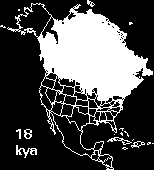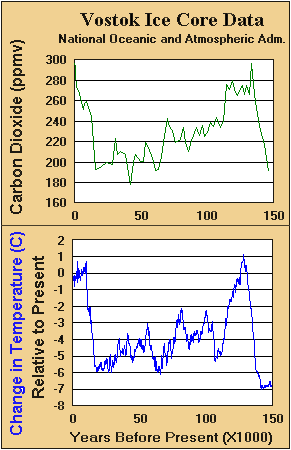 |
Global Warming |
Is Global Warming real ?
Earth's Icehouse History
The Role of the Greenhouse Effect
Ready... fire... aim?
Is Global Warming real?
Earth's climate is changing. The result so far:
Global temperatures have risen 5° C
Glaciers have melted and retreated dramatically
Ecosystems around the world are being altered
This is not new news. These changes started 18,000 years ago, as the earth emerged from the Pleistocene Ice Age-- a time when ice-covered mammoths and mastodons roamed the earth.
Geologists know great ice sheets once covered large portions of the continents. These glaciers have alternately retreated and advanced as the earth has warmed and cooled, in cycles spanning hundreds, thousands, and millions of years.
Historical data from ocean sediments and ice cores indicate warm interglacial periods of 15,000 - 20,000 years separate each major ice age. We currently are in an interglacial period, and are due ( some say overdue ) for the next 100,000- year Ice Age.
Earth's Icehouse History
 Beginning
about 18,000 years ago the Earth started warming up, halting at least temporarily
a 100,000-year-long Ice Age, during which the upper latitudes of almost
all the continents lay buried under thick sheets of glacial ice.
Beginning
about 18,000 years ago the Earth started warming up, halting at least temporarily
a 100,000-year-long Ice Age, during which the upper latitudes of almost
all the continents lay buried under thick sheets of glacial ice.
The Earth was a much colder and drier place then. Deserts were more extensive, summers were short, and winters brutal. Approximately 1/5 of the forests on the planet were obliterated by the great ice sheets. Over 1/2 of the continent of North America was a desolate wasteland of ice.
At the peak of glaciation, oceans were 300 feet lower than they are today, allowing animals and men to walk from Siberia to Alaska across the Aleutian Land Bridge, causing changes to the ecosystem of North America. It wasn't until about 15,000 years ago that global warming caused the great glaciers to retreat, allowing establishment of our accustomed environment. Average global temperatures have risen about 5° C since the last Ice Age.
The Role of the Greenhouse Effect
From an historical perspective, global warming has saved us, at least temporarily, from an Icehouse Climate, although humans can hardly take the credit.
Science is clear on what controls cycles of climate change. Global warming (and cooling) cycles are controlled primarily by:
- 1) Cyclical variations in the sun's energy output
- 2) Eccentricities in Earth's orbit
- 3) The influence of plate tectonics on the distribution of continents and oceans
- 4) The so-called "greenhouse effect," caused by atmospheric gases such as gaseous water vapor (not droplets), carbon dioxide, methane, and nitrous oxides, which help to trap radiant heat which might otherwise escape into space.
The "greenhouse effect" actually is a bit player in global climate (although without it's benefits the average temperature of the Earth would be minus 18° C). Human's did not cause the greenhouse effect, but critics maintain human additions to atmospheric greenhouse gases may cause global temperatures to rise too much.
Generally understood, but rarely publicized is the fact that 95% of the greenhouse effect is due solely to natural water vapor. Of the remaining 5%, only 0.2% to 0.3% of the greenhouse effect (depending on whose numbers you use) is due to emissions of carbon dioxide and other gases from human sources. If we are in fact in a global warming crisis, even the most aggressive and costly proposals for limiting industrial carbon dioxide emissions would have an undetectable effect on global climate. However, significant efforts to limit the emission of greenhouse gases in the United States are currently underway.
Ready... fire... aim?
In Kyoto,
Japan![]() in December 1997 former President Clinton and former Vice President
Gore agreed to commit the United States to significant future reductions
of carbon dioxide emissions, principally by cutting the use of fossil fuels
by as much as 30% over the next 10 years. It is assumed that these drastic
proposed measures will have a real effect on protecting Earth's climate--
an assertion that many climate experts are reluctant to support.
in December 1997 former President Clinton and former Vice President
Gore agreed to commit the United States to significant future reductions
of carbon dioxide emissions, principally by cutting the use of fossil fuels
by as much as 30% over the next 10 years. It is assumed that these drastic
proposed measures will have a real effect on protecting Earth's climate--
an assertion that many climate experts are reluctant to support.
While scientists are currently searching for proof that emissions from the burning of fossil fuels are warming the planet, there exists no solid proof at this time.
The strongest evidence for a problematic greenhouse effect is data generated from computer models which predict about 1.5° C of warming in the next 50 years unless something is done to change the rate of carbon dioxide entering the atmosphere.
While computer climate models may eventually be able to predict future climate change, so far the ones we have are very unreliable-- unable even to accurately predict current climate conditions using current climate data.
Kevin Trenberth, head of climate analysis at the National Center for Atmospheric Research in Boulder, Colo. ( in an interview for the Washington Post, May 1998 ).
It will be some time before computer models will be able to reliably predict future climate change. Meanwhile, policy-makers like the United Nations and the Clinton/Gore Administration contend that we do not have time to wait.
 Economists
fear putting the United States on a strict carbon diet could stall
a booming U.S. economy and reignite inflation.
Economists
fear putting the United States on a strict carbon diet could stall
a booming U.S. economy and reignite inflation.
Prominent climatologists like Dr. Richard Lindzen of MIT and Dr. Patrick Michaels of the University of Virginia contend that we would do well to carefully consider what the greater body of scientific evidence has to say on the matter of global warming before taking drastic measures. Their concerns are shared by other scientists who are troubled that the issue of global warming seems driven more by politics than by sound science.
Geologic history clearly shows that Earth's climate is dynamic and ever-changing. While carbon dioxide as a constituent of Earth's atmosphere has been increasing since the industrial revolution, it has been similarly increasing since the earth started warming 18,000 years ago. Clearly, there are natural forces at work.
All sides agree the subject of climate change is a complex one. Prudent science maintains that in our pursuit to understand our climate future we must also understand Earth's climate past. Toward this objective the next page explores Earth's climate history over the last 750,000 years-- essential reading if you are concerned about or interested in the issue of global warming.
|
|
| |
CREDITS:
ANIMATED GLACIER: Courtesy of Illinois State Museum